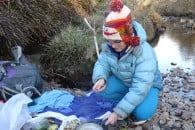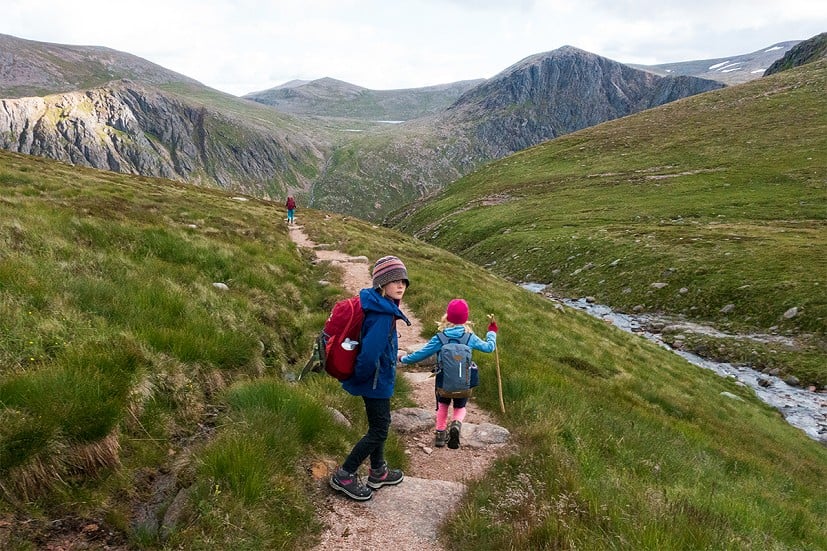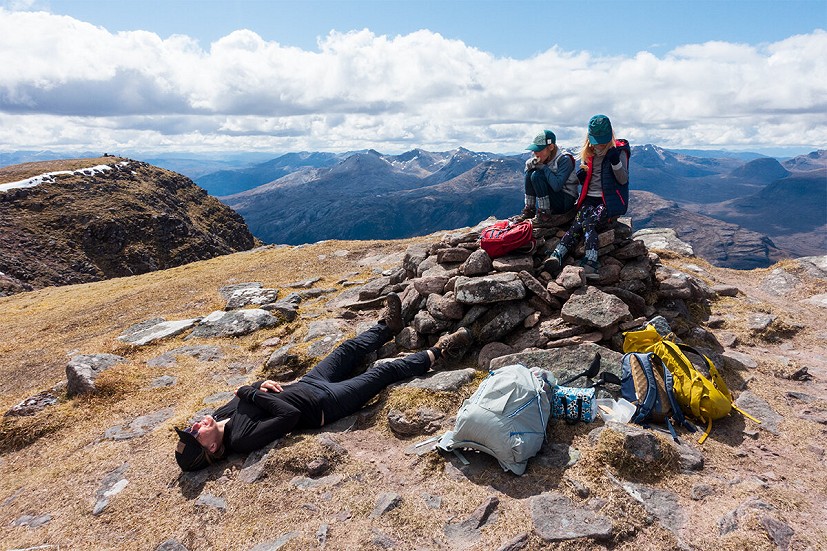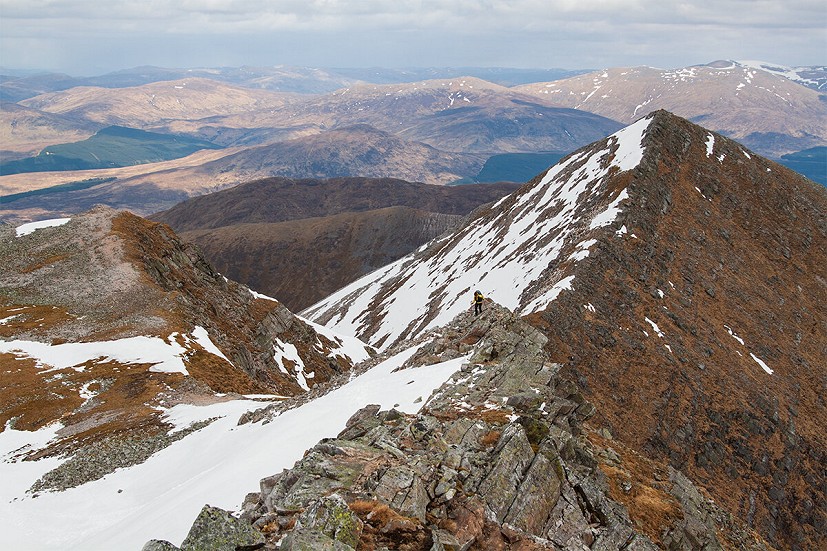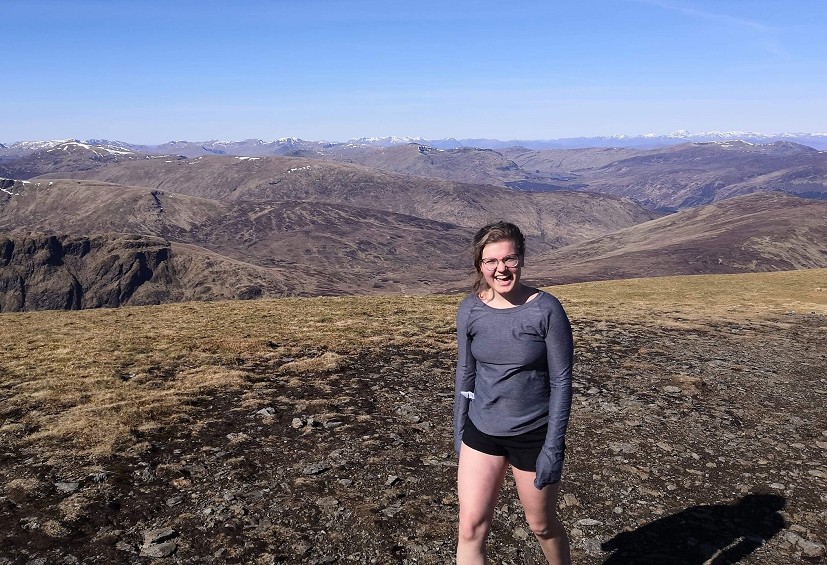Snail's Pace: Coping With Being the Slowest Person on the Hill
It can be demoralising if your walking buddies always leave you for dust, but for the faster walker it's hard not to get frustrated too. Often at the rear herself, though never backward in coming forward, Fliss Freeborn suggests coping strategies for stragglers, and good ways to manage groups of varied speed and fitness.
While on holiday last week, I experienced the hedonic pleasure of riding an e-bike for the first time. It was a bit of an 'aha' moment for me, as it meant I was finally able to keep up with my partner who, seeing as he used to cycle for the Scottish national team, decided the bike he was hiring didn't need to come with batteries. That extra assistance was wonderful: not only I could keep up easily, but I could admire the scenery and have a conversation with my other half at the same time. It also meant that he didn't have to crawl alongside me, push me up the hills, or wait every 30 seconds - and his joy at being able to ride at a decent pace with me for once was palpable.
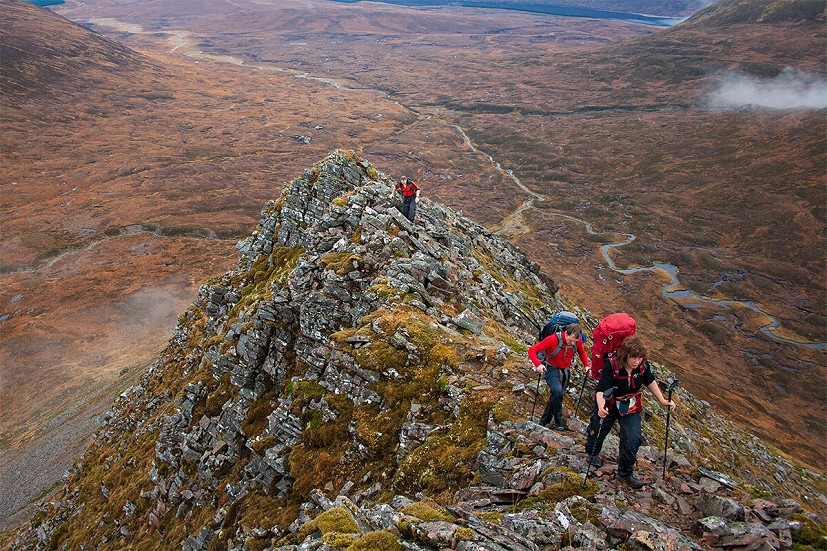
Now, if only someone would invent electric powered walking boots, then all of my problems would be solved. This is because I have always been the slowest person in the group when it comes to uphill activities: if there is a Munro to be conquered, be sure I will be at the top at least five minutes after everyone else. My tall friends can walk 5k in the time it takes me to run it. On touring skis, I shuffle uphill like a retiree in tartan slippers, except these particular slippers cost me a month's rent. And until that day out on the e-bike, I hadn't realised how much of an emotional weight this meant carrying around with me the whole time.
There are two issues deeply entwined here which I feel need to be explained. The first is my own inferiority complex stemming from being chronically slow in comparison to my peer group. I'm unpacking it here not because I get a kick out of displaying my innermost thoughts to a bunch of strangers on the internet, but because it's useful to show someone who doesn't have a clue what it's like to struggle. The second, less abstract issue is how to cope with the practical realities of walking with someone who doesn't go at the same speed as you.
To inferiority and beyond
I've no doubt that everyone gets dropped now and again, and we all have friends who are fitter than us. But just imagine lagging behind every time you go outside with your pals. It's hard to not let it wear you down.
You can still have a great day if you walk at different paces. It just takes sensitivity from the faster walker, and self-confidence from the slower one
Naturally, I've tried to make this un-happen. I have spent months on treadmills; I have dutifully plodded around parks with weighted ankles (which I affectionately term "wankles"); I have spent my lockdown exercise time going on silly fast runs, then going on silly slow runs, and generally just trying to expand my zone one fitness to something which might at some point propel me to the top of a hill slightly faster than a retreating glacier.
If I were comparing my progress to myself alone, I'd see that it wasn't all doom and gloom - I really have got faster over the years. The reality, however, is that I have friends who have always been athletes. No matter how hard I try, I will never have done my first big hill aged four, been an international cycling champion at 16, nor cut my hill-going teeth as a mountain marathon competitor - so naturally, I do not have the lungs to show for it. The hardest part for me is constantly feeling like a burden. I don't think this will ever go away fully, but there are a few things I do to help myself cope with it all. And if you're on the opposite end of the spectrum and find you can wolf down six Munros for dinner and still have room for an iced Wainwright or two for pudding, then there are a few things you can do too.
How to stay positive when you're crawling along like a snail in a race against drying paint
Over the years, I've developed a few techniques to keep my head up when I can feel myself lagging.
Firstly, I remind myself that my worth as a walking partner is not solely dependent on my speed. I am also there to provide excellent chat, top-tier hill snacks and to enjoy being in a beautiful place with my beautiful friends. When I do inevitably slip behind, I try to reassure myself that my pals will be waiting at the next bealach only a few minutes, not a few years. They can cope.
Secondly, I try not to think of them as being annoyed with me, as I will spiral into horrendous trauma-informed self doubt if that happens. I do not want this.
But one thing I do not do anymore is attempt to speed up. Walking at something that is way beyond my natural pace feels horrible over a long distance, and will exhaust me, rendering me miserable for the evening, and probably for the next day too.
Additionally, I have learned that it's ok to let your group take some of the weight off your back if you're on a multi-day trip and really do need to be at camp by nightfall. I've had to swallow a lot of pride over the years and give up tents, stoves, emergency shelters and food to someone more capable of carrying them without being slowed down - when you're wee and slightly less fit than your friends, every kilo you're carrying will count against you, so make sure everything is equitably split, rather than equally. I just make sure I'm helpful when I get to camp, which generally manifests as cooking everyone dinner and then suggesting we all go skinny dipping.
What to do if you're Speedy Gonzales and you're waiting for Captain Paint-Dry all the time
So, you're the fast one. Lucky you. What you can do is walk alongside me. Talk to me. Go at my pace. Let's chat about our favourite food, or what breed of dog each of our friends would be in a parallel canine universe. You're the one with the advantage here, so whatever you do, please don't make me keep up with you, or get visibly annoyed by having to wait. And of course, it's not you who is responsible for my feelings of inadequacy - that's all on me and boy do I know it. But it'll help a lot if you don't make any comments about how much time we're losing, or huff and puff and look at your watch as I'm appearing over the crest of the hill, red faced and breathless because you've steamrollered ahead. Basically, don't be a plonker - we're here to have fun, not to pretend we're on a timed military exercise.
And what to do in a group setting
Slower people often feel like a huge burden, so do reassure them that you're also enjoying yourself
So far I've vaguely gestured towards there being two of you out on the hill. But what if, say, you've got four million friends made predominantly through your local mountaineering club and you fancy all getting out together for a jolly?
Well, you've got a couple of options. If there's more than eight of you, you're looking at splitting off into hares and tortoises. This will keep everyone happy in the long run: those who want to get ahead can do so, and those who fancy a more gentle pace don't have to worry about keeping up.
If it's not feasible to split the group, then that's still fine. You're now a slightly bigger team, and it's good to remember here that the whole group is responsible for the wellbeing of its members. And look, I'm not expecting you to walk as if you're synchronised swimmers, but as a general rule of thumb, make sure that the back person is still within shouting distance of the front person, for safety if nothing else. Bad things happen on the hills when egos get in the way, so even if you're not all going at the pace of the slowest person (and as the slowest person, I find it incredibly stressful to physically walk in front of the group as the pacemaker - don't make them do this if they don't want to), do make sure you're continually regrouping, or doing something useful such as navigating, re-checking the weather forecast, or snack-distributing when you're waiting for the slower folks to catch up.
And if you've got someone who's really lagging and not enjoying themselves, then ask - sensitively - how they're doing and whether they'd feel ok if you could take some pack weight off them, or whether they fancy taking a quick break.
Remember, slower people often feel like a huge burden to the rest of the group, so if things are looking a bit emotional, do reassure them that you're also enjoying yourself and you're not worried about pace or timings. What I've found is that discussing clear mini-goals, as in "we should have lunch by the loch - it's only 2k from here," or "do you fancy a swim in the burn on the way down?" is a great way to make folk feel more included, and also mentally divides the walk into more manageable sections for the person who might be suffering.
Lastly - and this is for anyone, not just slowcoaches such as myself - if you're not enjoying yourself, there really is no shame in turning back, or taking the shorter route. If it's pouring down, you've only done one out of your three intended hills, and the rest of the group have unceremoniously buggered off into the middle distance to leave you to your own sweaty-Gore-Tex-soaked thoughts, then yeah - you're totally entitled to be grumpy and inform your team that you're peeling off to the nearest warm place (of course, if it's safe to do so and you're equipped with everything you need to get down alone). Allowing yourself to do this without feeling shame or a deep sense of failure is very difficult, and something I'm still working on myself, but if your planned hike turns out to be a miserable trudge, and you'd far rather go and immerse yourself in a vat of hot chocolate, then lean into it. That's totally fine.
To summit up
Listen, you can still have a great day out in the hills if you walk at different paces. It just takes a little bit of sensitivity from the faster one, and some self-confidence from the slower one. It goes without saying that your route should be planned with all abilities in mind, and that plans should stay flexible if you're out for the first time with a person or group with whom you're unfamiliar in a hillwalking setting. And lastly, if someone could invent some turbo-charged walking boots, that'd be absolutely stonking.
